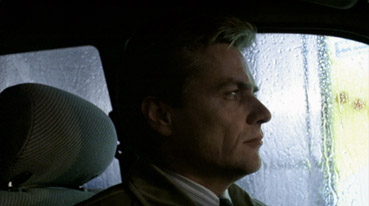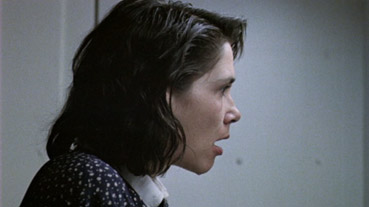|
Cinema
is famous for provoking debate about issues on which it
offers no answers, but this is acutely true of Michael Haneke's
first feature, The Seventh Continent [Der
Siebente Kontinent]. The film observes the
slow disintegration of a seemingly normal bourgeois family,
but records only the symptoms of their decline and never
attempts to examine the causes, to explain what drives them
to behave as they do in the final act. Action without supplied
reason – the whys and wherefores left for the viewer to decide
– should make for largely superficial viewing, but
it doesn't. Haneke's meticulously crafted film is loaded
with suggestion and observational detail, and is far from
the potentially pedestrian experience it would undoubtedly
have been in less capable hands.

I have to admit that my first viewing of The Seventh
Continent a while back was something of a jolt,
but not for reasons of content. A few years previously I had
planned, scripted and storyboarded a video piece comprised
entirely of short close-ups of the everyday activities of
a normal middle-class family, the intention being to examine
our reliance on and peculiar adherence to everyday routine
and ritual. I eventually abandoned the project over concerns
that I was taking a somewhat condescending attitude to my
subject, passing judgement on the emptiness of lives that
I actually knew little about. Haneke here uses that very
technique for much the same end, and yet he makes it work,
in part because it is not the be-all and end-all of the film,
but also because the process itself is subject to narrative
evolution. The three years covered by the film's time frame
are divided into chapters, and the repeated close-up sequences
show both the continuation of the daily routines that define
family life, and yet at the same time hint at the breakdown
that is taking place beneath the surface calm.
What
should act as a distancing device miraculously connects
us with the family in an unexpected way. Like friends or
relatives you see only occasionally and in whom you perceive
changes that they either attempt to mask or refuse to explain,
the natural reaction is to wonder what is wrong and be concerned
for the consequences. Constructed largely of non-sequiturs
of varying length, the film documents the process of familial
collapse as a series of briefly glimpsed iceberg tips, leaving
us to figure out for ourselves just why, for example, Anna
breaks down and cries uncontrollably at the car wash shortly
after passing a fatal road accident. Did the sight of the
plastic-covered bodies revive unhappy memories, or bring
home the reality of decisions made and action to be undertaken?
As
the family systematically set about destroying their flat
and its contents (an extraordinary scene in its own right),
the metaphoric implications are explicit but unforced, as
they turn their back on materialism and its baggage, the
last crutch in a society in which the false comforts of
religion have already proved ineffective. It's a downward
slide to a final scene that is as sobering as any you'll
find on DVD this year. That it is also an emotionally affecting
one is due in no small part to a trio of very fine performances,
communicating so much in the small windows that are opened
onto their world. We may not understand exactly what is going on but we feel for the consequences, and as they sit in the
dark, grimly watching music performances on the TV that
is their only remaining possession, Jennifer Rush's 'The
Power of Love' becomes the saddest song in the world.

What
on the surface could be seen as a formal and sterile cinematic
exercise actually proves a compelling and meaningful (if
seriously downbeat) experience. As with all of Haneke's
subsequent features, we are left with a pile of unanswered
questions, but like the best of his more recent work, the
emotional wallop is nonetheless keenly felt.
Framed
1.78:1 and anamorphically enhanced, this is for the most
part a pleasing transfer, a clean, clear presentation from
a decent print, although there is a very slight softness
to the image, despite the good detail and contrast levels
in many of the scenes. The quality drops off a little in
low light shots, but these are rare. There is some grain
evident throughout, but this is never distracting.
Sound
is never used to flashy effect, and the Dolby 2.0 mono track
here serves the film well enough and is clear of problems.
As
with the other two films in the set, this DVD features a
Michael Haneke Interview (16:43),
in which the director looks back at the film in question.
A very interesting piece in its own right, I couldn't help
feeling a sense of stolen thunder, as Haneke discusses all
of the points I had made a note to cover in my review, though
I was at least left feeling that I'd read the film as the
director had intended I should. Haneke is a good talker
and this is a useful companion to the film, but should be
watched afterwards if you don't want the ending given away.
Also
included is a Funny Games Trailer
(1:09), and it's for the original not Haneke's own upcoming
English language remake.
Haneke's
first feature is an experiment in form and approach that
impresses in its filmmaking and delivers a surprising emotional
clout, given the distance the technique should by rights
put between us and the characters. The presentation is largely
fine, and the interview with Haneke a useful extra.
|